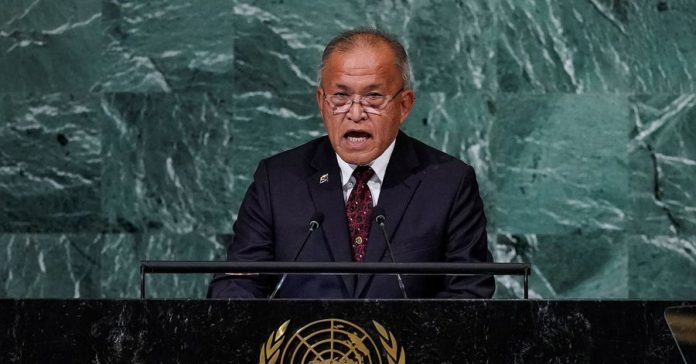It was 31 years ago when the Marshall Islands’ first president, Amata Kabua, appeared before the UN General Assembly to sound the alarm over global warming. Today, his son — current president David Kabua — is still sounding the alarm, which has only gotten more dire.
Speaking to world leaders gathered at the high-level leaders’ meeting Tuesday, the younger Kabua described the longstanding fight to keep his low-lying island nation above water.
“Today, we renew our call to the world to declare total war on this century’s greatest challenge — the climate change monster,” he said.
Kabua bemoaned the fact that after so many years, “the world has failed to break our addiction to fossil fuels.”
“We are not investing enough in life-saving adaptation, particularly for small island states,” he said.
He urged world leaders to drastically increase renewable energy while also taking on sectors that rely on fossil fuels, including aviation and shipping.
kabua pointed to the Marshall Islands’ carbon levy proposal for international shipping that he says “will drive the transition to zero emission shipping, channeling resources from polluters to the most vulnerable.”
UN Secretary-General Antonio Guterres has likewise encouraged going after the world’s largest polluters.
During his opening remarks to the assembly on Tuesday, he pushed for richer countries to tax the profits of energy companies and redirect the funds to both “countries suffering loss and damage caused by the climate crisis” and those struggling with the rising cost of living.
Kabua, along with the leaders of Tuvalu and Kiribati, plan to launch the Rising Nations Initiative on Wednesday to press for innovative efforts among Pacific atoll island countries to combat climate change.
Also on Tuesday, Kabua described his growing concerns over nuclear weapons testing and detonation, calling the Marshall Islands “ground zero for the testing of the 67 nuclear and thermonuclear weapons for 12 years during the UN-U.S-administered trusteeship era.”
“The exposure of our people and land has created impacts that have lasted – and will last – for generations,” Kabua said.
“These impacts to our human rights, land, culture, health and lives, are burdens that no other nation or country should ever have to bear.” he said.
SOURCE: AP/PACNEWS













